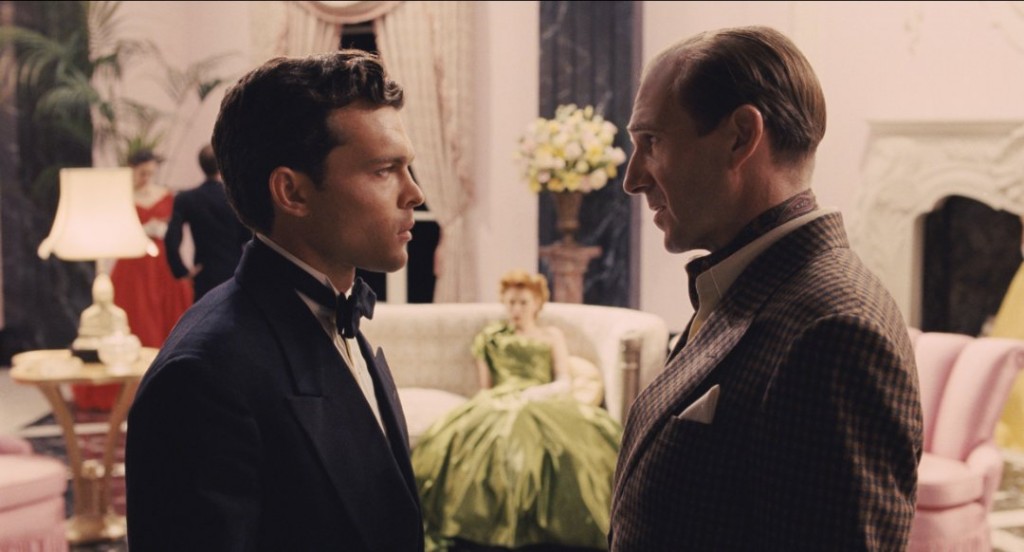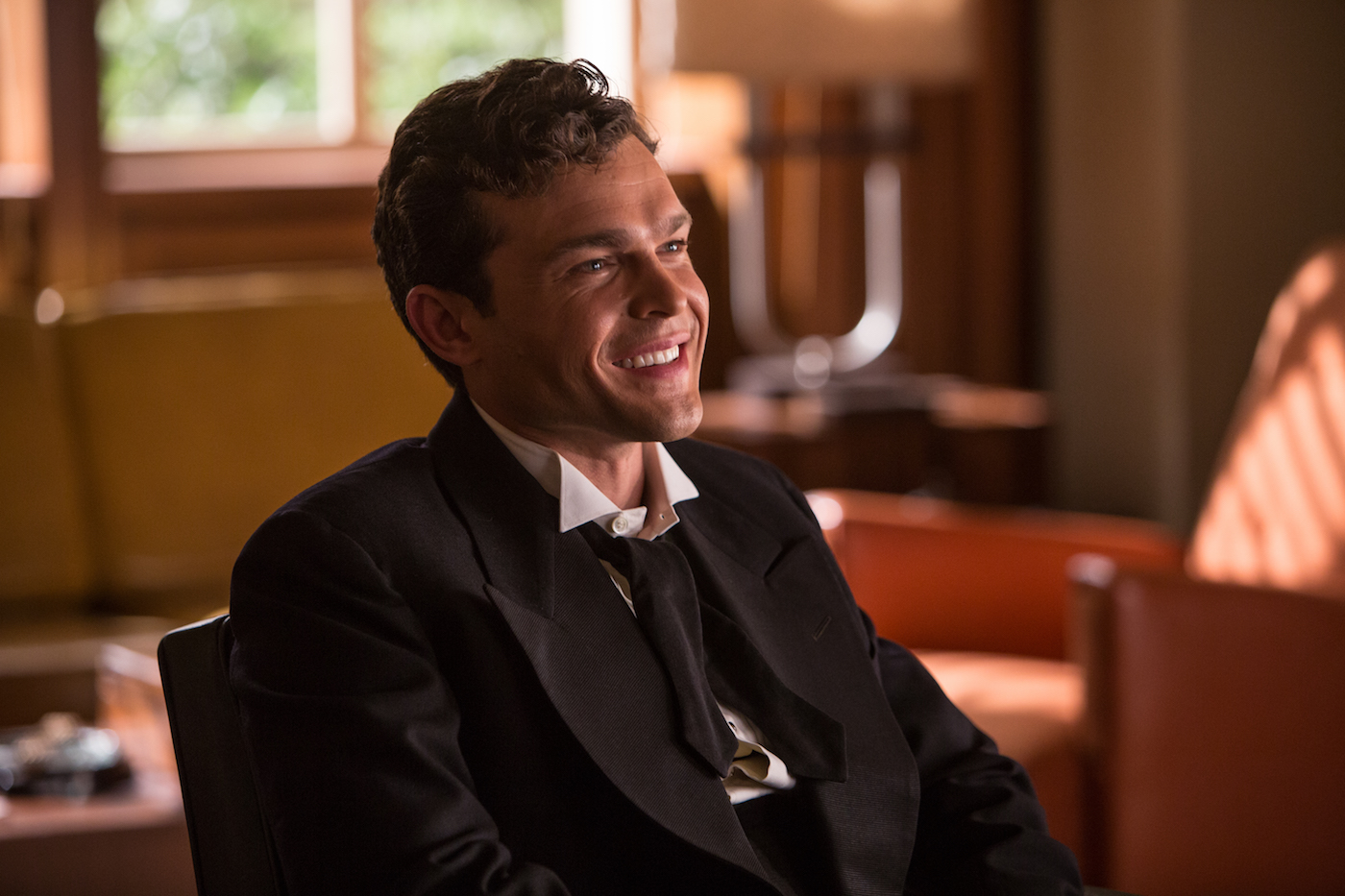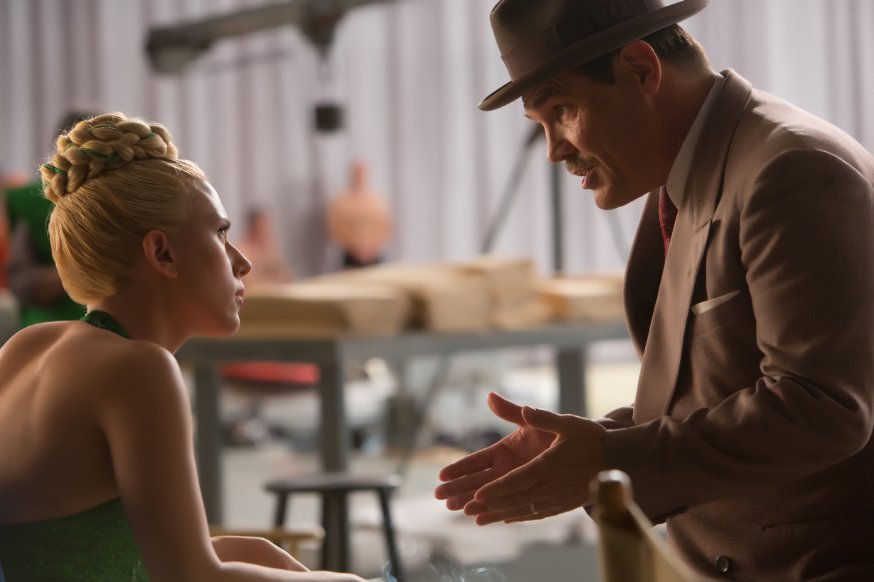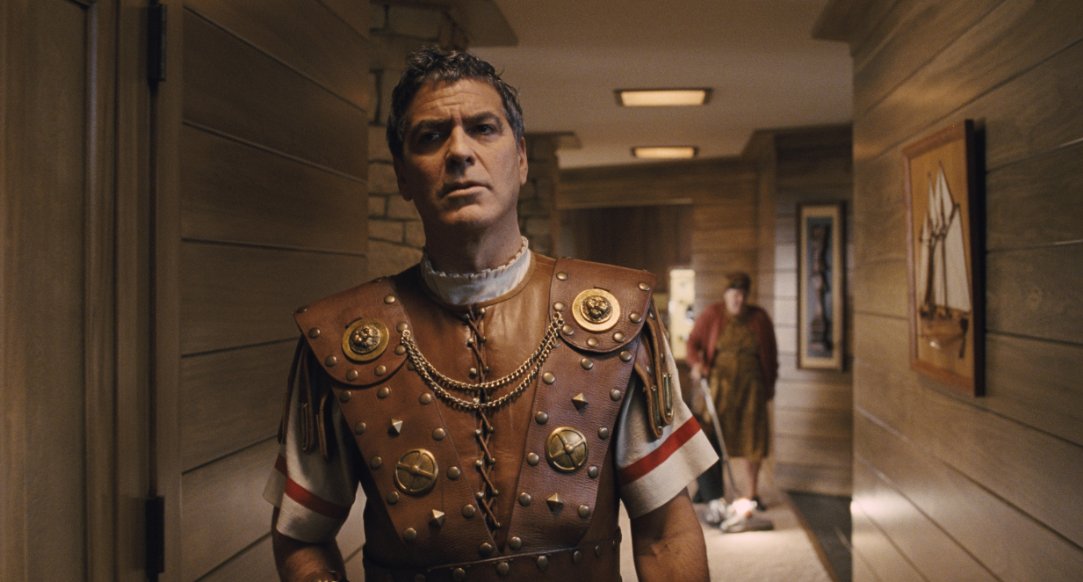A powerful man sitting behind a desk? Check.
A suitcase full of money? Check.
A night drive on a dark and winding road? Check.
High-speed banter à la Preston Sturges? You betcha.
Yes, indeed — Hail Caesar! is a movie by Joel and Ethan Coen. It has all of the defining characteristics.
In fact, it’s more like a Coen Brothers film festival. As we follow Edward Mannix — the Catholic (and thus conscience-burdened) Capitol Pictures production “fixer” who is the wandering but binding thread of the story — through his daily routine of keeping feature films on schedule, on budget, and under control, we get a grand tour of the spectacularly realized movie sets, the genre conventions, and the pre-HUAC political paranoia of the 1950s.
And each soundstage comes with its own cast and crew, its own set of troubles and triumphs:
• the parlor-room cocktail drama Merrily We Danced, where director Laurence Laurentz (Ralph Fiennes) struggles to un-drawl his Texan lead actor, a dopey Hollywood heartthrob named Hobie Doyle (Alden Ehrenreich);
• an Esther Williams-style “aquamusical” in which the main mermaid is played by a snarling and scandal-prone starlet (Scarlett Johansson);
• a goofy Western with its standard-issue comic-relief drunkard;
• a South Pacific-style musical, in which dame-deprived sailors are turned loose in a song-and-dance number as frenzied in its footwork as it is flagrant in its euphemisms (I’ve now lost any remaining misgivings I had about Channing Tatum’s movie star status — he’s sensational); and, best of all,
• the titular Ben-Hur-style “Tale of the Christ,” starring a sort of Charlton Heston/Clark Gable mash-up named Baird Whitlock (George Clooney, adding another memorable idiot to his impressive Coen Brothers collection).
These multiple personalities are the film’s greatest achievement and its biggest problem at the same time: While Hail, Caesar! is never less than entertaining, the movie’s constant mode-changing — each environment introducing new characters and backdrops and styles — results in a film that just doesn’t hold together. This is one of those rare occasions where the Coens’ aesthetics upstage their writing and unbalance their momentum.
The Coens have proven time and time again that they can weave wildly disparate scenarios together into an unlikely, coherent whole: Raising Arizona‘s H.I. McDonagh has such a strong voice and persona, never to be outdone by his co-stars, that he commands our attention and affection; O Brother, Where Art Thou? moves episodically through the familiar chapters of The Odyssey; The Hudsucker Proxy is unified by a glorious soundtrack and an enchanting magical realism; and in The Big Lebowski, well — the ever-abiding and loveably long-suffering Dude just ties the whole room together.
But Mannix (Josh Brolin), our beleaguered guide blundering through wonderland, is so stable, steady, and understated that it’s hard to focus on him in the midst of so many bizarre, cartoonish co-stars. And it doesn’t help that an intrusive narrator keeps taking us away from him to spend time with a long-winded secret society, tangents that dull the punch of the picture.
It isn’t Brolin’s fault that Mannix isn’t a strong enough center point; this may be the most likable performance in his increasingly impressive career. (Who could have imagined that Brand of The Goonies would grow up to have enough range for such roles as Oliver Stone’s George W. Bush, Paul Thomas Anderson’s “Bigfoot” Bjornsen, and the Coens’ lunk-headed Llewelyn in No Country for Old Men?) But we’re so busy adapting to the movie’s constant costume changes that it’s hard to discern what is really at stake for him, besides the possibility of professional burnout. And it’s hard develop much care for what becomes of him as he marches from soundstages to nightclubs to studio meetings.
I’ve already heard from enough Coen fans and film reviewers to know that the film is going to find a range of super-fans, nay-sayers, and everything in between. But speaking for myself, I found too many of the film’s talky encounters to be straining for the kind of inspired chemistry that characterizes the best of the Coens’ manic comedies. It succeeds only in fits and starts. But when it succeeds, it soars — as in Fiennes’ dialogue tutorial (which, alas, was a focus of the trailers); the aforementioned “No Dames” dance number; a brilliantly unexpected tangent featuring Frances McDormand; and the action’s outrageous climax at sea.
Still, a disappointing Coen Brothers comedy is (with the exception of The Ladykillers) still a much better time at the movies than almost anything else playing in theaters. The performances are reason enough to bring me back to buy another ticket — especially Ehrenreich’s, who seems to have been produced by some kind of Coen Brothers Cast Member Algorithm; he’s perfect for their dialect-heavy dialogue.
Perhaps the biggest disappointment for me was that Emily Beecham, who makes a strong impression in the one parlor-room scene she plays over and over again with Ehrenreich, doesn’t have any more to do in the film. I want to see a whole film about her character. She looks so perfect in 1950s fashion that she’d be a knockout as the lead in a Lucille Ball biopic.
Having said all of that — and I’m being deliberately vague here to avoid spoilers, because the more you discover on your own the better time you’ll have — I’m most interested in how the film explores tensions between Hollywood’$ bottom-line prioritie$, the idea that movies can do some real good for “the common man” (Remember Barton Fink?), and appeal of faith — in this case, the Gospel quite specifically.
[What follows could be described as vaguely spoiler-ish, but not really.]
I’ve already seen more than one reviewer treating Hail, Caesar! as if it is makes a mockery of Jesus along with those who make fools of themselves in claiming to following him. I couldn’t disagree more.
While Hail, Caesar! finds plenty to satirize in religiosity — in the parlance of the pious, in the blondeness of Hollywood Jesus hair, in debates between religious leaders — the role of the faith itself remains untainted. Christianity is, after all, what keeps Mannix from crumbling under the pressure. The film is book-ended with the fixer’s crises of conscience in a confessional booth, clutching his rosary and — for all of his professional indiscretions — yearning to be the man he was meant to be.
And, just as The Hudsucker Proxy‘s holy fool and The Big Lebowski’s bathrobed Dude were both comical Christ figures exploited and persecuted along their almost-blameless way, so Hail, Caesar! hints that Mannix is, in this not-so-heavenly kingdom, the beloved son who must speak wisdom and bring order to an unholy rabble. He’s even given a “last temptation” — a choice between suffering fools for the rest of his career or taking the relief of an “easy” job (working for Lockheed Martin on a project involving H-bombs, which causes him to shiver and murmur “Armageddon“).
While Mannix may be the “redeemer” of botched motion pictures, the Messiah Himself has an even more surprising and meaningful role. The film’s opening shot shows us Christ suffering on the cross for sinners, and nothing about it is meant for laughs… until the camera descends to a sinner’s awkward confessions. That figure will return again, in the flesh and blood of a genuinely tortured extra, radiating glory that may occasionally bleed through the cracks in these hard-hearted Hollywood exteriors. Some will interpret this as a scene about the power of movies, not the power of the Gospel. But it works because it proves both: The Gospel is about revelation through incarnation, and cinema at its best — like any art form — finds human beings imitating that same act by practicing the mysteriously collaborative work of creativity.
This passion play provides, for a moment, an icon light bulb bright enough to expose the foolishness of human behavior and show these buffoons how to better themselves. Consider it a contemporary work by Pieter Bruegel the Elder. Whether they mean to or not, the Coens find in the Gospel a beacon that beckons everyone out of their self-absorption, their petty concerns, their troubles, and their banality. Even Baird Whitlock himself may, for one unwitting moment, believe the testimony that his character delivers at the foot of the cross. That the scene inevitably collapses into exposing human foolishness only serves to emphasize the mysterious singularity of that figure who remains just out of frame.
Whatever the case, I was moved by this unlikely moment.
As with the musical undercurrent of O Brother, Where Art Thou?, it is that surprising suggestion of the sacred in this spectacle that will bring me back to Hail, Caesar’s uneven affair. I doubt it will ever be one of my favorite Coen films, but man oh man do I wish this film had been around when Matt Zoller Seitz invited me to discuss the theology of the Coen Brothers. This movie brings more to that subject than anything they’ve yet made.
And, as per usual, the strongest impulse I have upon seeing a new Coen Brothers movie is the desire to see another new Coen Brothers movie. What in the world will they think of next?
•
Share your impressions in the Comments below or on the Looking Closer Facebook page.






Such a great review, Jeff! Of course, I, like a million others, am anxious to see this movie, and like a million other “Coen Brothers freaks”, am ready to love it or pan it. CB movies seem to polarize, I think in part, because we expect (or hope) for too much. What resonated for me in your review were your words about chemistry, and I think with CB movies, not only character roles or casting is paramount, but also plot. Fargo had both in spades, as did other successful CB movies, but if the plot (or even the premise) falls short, can even the Coen Brothers succeed or make good?
The Ladykillers is a wonderful movie. It’s just not a remake of “The Ladykillers,” which is why people don’t like it. You can rarely trust the Coen Brothers when they “remake” anything — they are usually doing something very different. Not the case in several recent movies, of course.